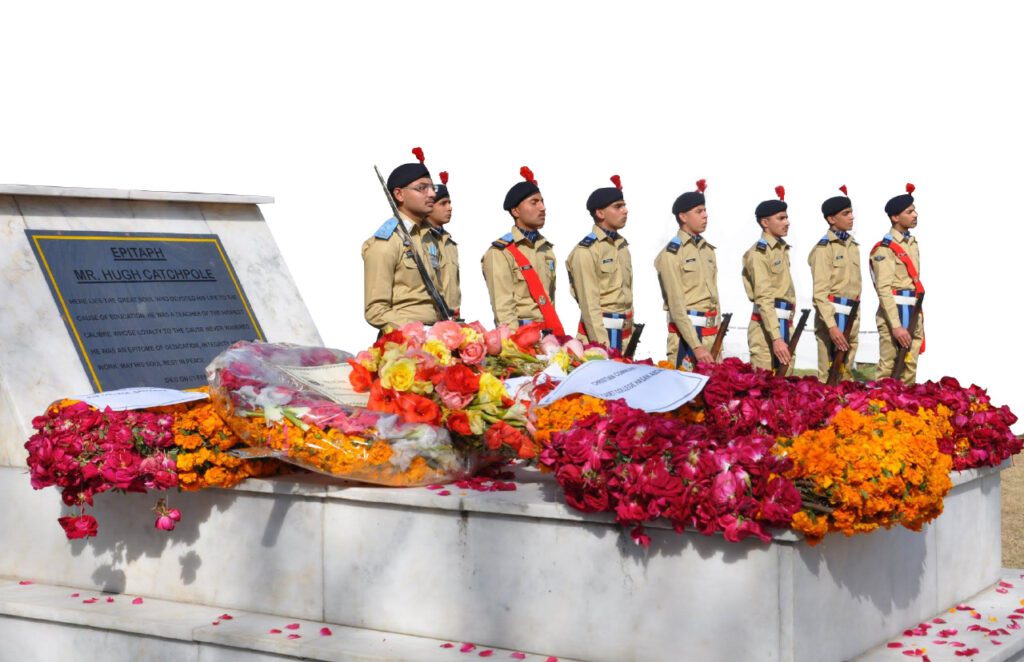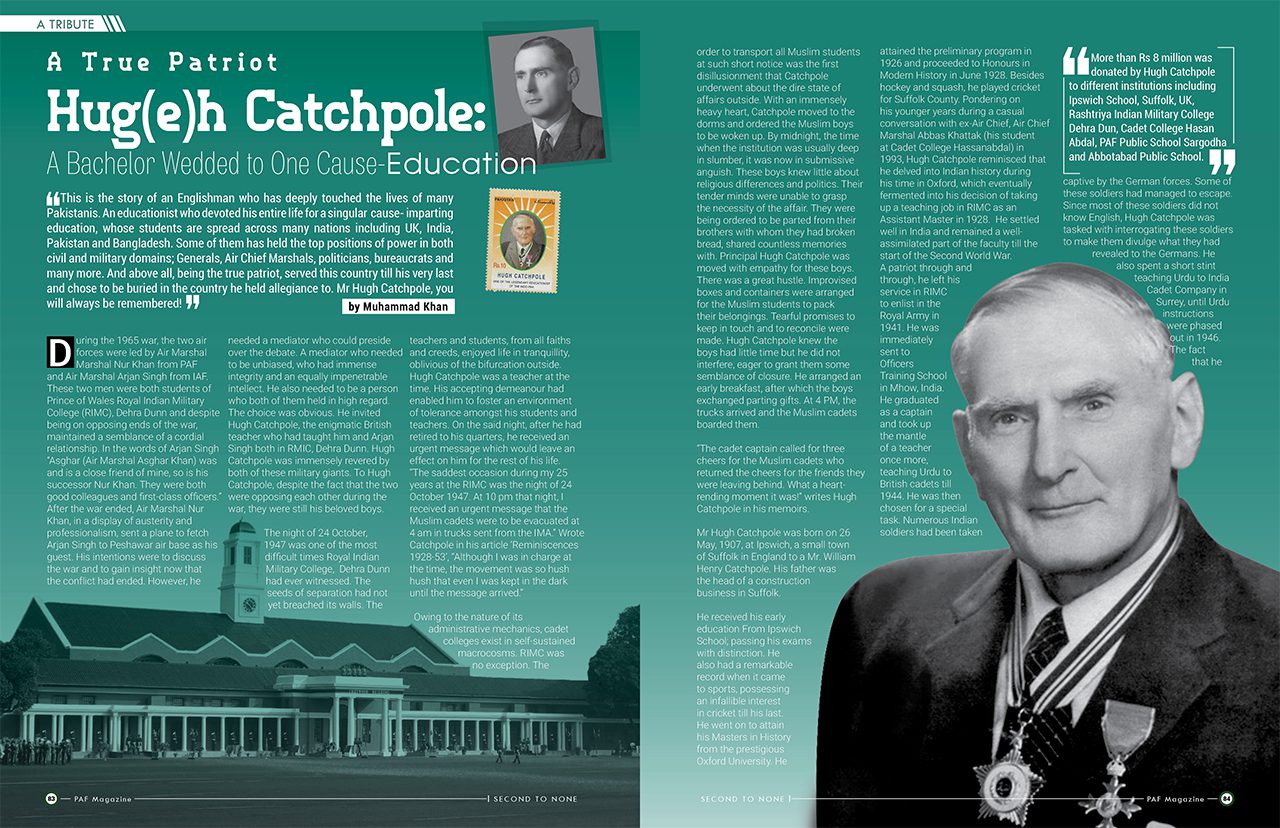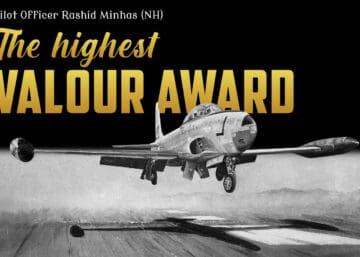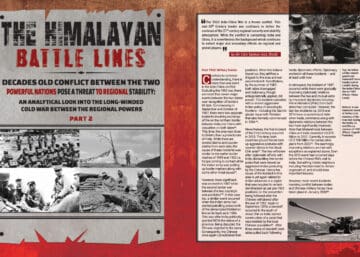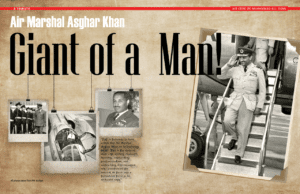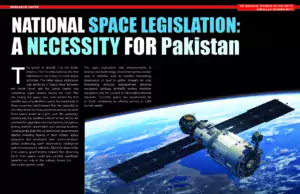A Bachelor Wedded to One Cause-Education
This is the story of an Englishman who has deeply touched the lives of many Pakistanis. An educationist who devoted his entire life for a singular cause- imparting education, whose students are spread across many nations including UK, India, Pakistan and Bangladesh. Some of them has held the top positions of power in both civil and military domains; Generals, Air Chief Marshals, politicians, bureaucrats and many more. And above all, being the true patriot, served this country till his very last and chose to be buried in the country he held allegiance to. Mr Hugh Catchpole, you will always be remembered!
During the 1965 war, the two air forces were led by Air Marshal Marshal Nur Khan from PAF and Air Marshal Arjan Singh from IAF. These two men were both students of Prince of Wales Royal Indian Military College (RIMC), Dehra Dunn and despite being on opposing ends of the war, maintained a semblance of a cordial relationship. In the words of Arjan Singh “Asghar (Air Marshal Asghar Khan) was and is a close friend of mine, so is his successor Nur Khan. They were both good colleagues and first-class officers.”
After the war ended, Air Marshal Nur Khan, in a display of austerity and professionalism, sent a plane to fetch Arjan Singh to Peshawar air base as his guest. His intentions were to discuss the war and to gain insight now that the conflict had ended. However, he needed a mediator who could preside over the debate. A mediator who needed to be unbiased, who had immense integrity and an equally impenetrable intellect. He also needed to be a person who both of them held in high regard. The choice was obvious. He invited Hugh Catchpole, the enigmatic British teacher who had taught him and Arjan Singh both in RMIC, Dehra Dunn. Hugh Catchpole was immensely revered by both of these military giants. To Hugh Catchpole, despite the fact that the two were opposing each other during the war, they were still his beloved boys.
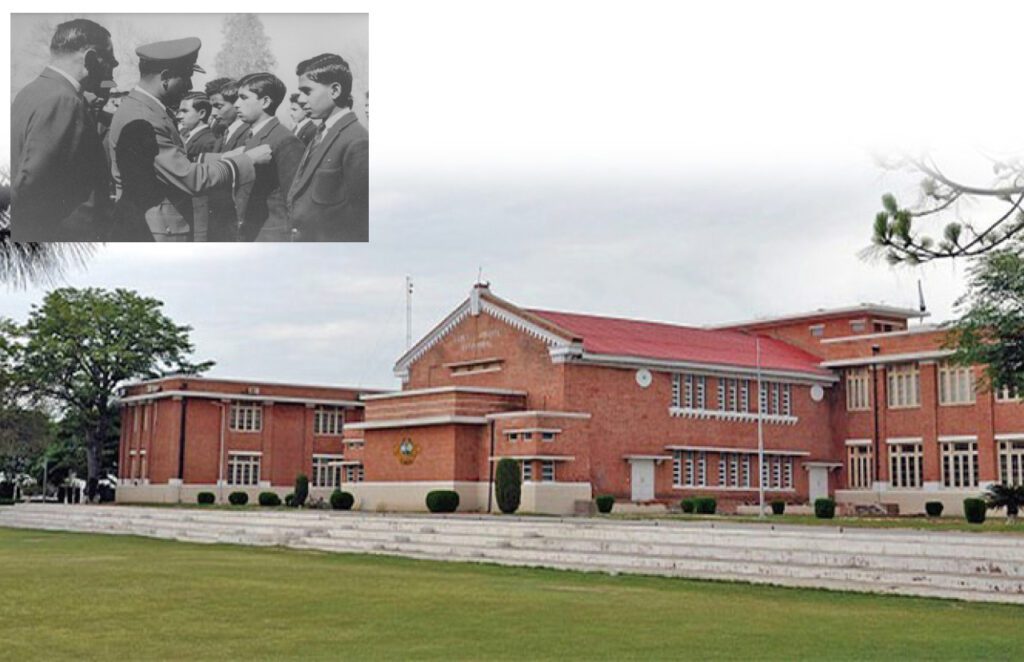
The night of 24 October, 1947 was one of the most difficult times Royal Indian Military College, Dehra Dunn had ever witnessed. The seeds of separation had not yet breached its walls. The teachers and students, from all faiths and creeds, enjoyed life in tranquillity, oblivious of the bifurcation outside. Hugh Catchpole was a teacher at the time. His accepting demeanour had enabled him to foster an environment of tolerance amongst his students and teachers. On the said night, after he had retired to his quarters, he received an urgent message which would leave an effect on him for the rest of his life.
“The saddest occasion during my 25 years at the RIMC was the night of 24 October 1947. At 10 pm that night, I received an urgent message that the Muslim cadets were to be evacuated at 4 am in trucks sent from the IMA.” Wrote Catchpole in his article ‘Reminiscences 1928-53’, “Although I was in charge at the time, the movement was so hush hush that even I was kept in the dark until the message arrived.”
Owing to the nature of its administrative mechanics, cadet colleges exist in self-sustained macrocosms. RIMC was no exception. The order to transport all Muslim students at such short notice was the first disillusionment that Catchpole underwent about the dire state of affairs outside. With an immensely heavy heart, Catchpole moved to the dorms and ordered the Muslim boys to be woken up. By midnight, the time when the institution was usually deep in slumber, it was now in submissive anguish. These boys knew little about religious differences and politics. Their tender minds were unable to grasp the necessity of the affair. They were being ordered to be parted from their brothers with whom they had broken bread, shared countless memories with. Principal Hugh Catchpole was moved with empathy for these boys. There was a great hustle. Improvised boxes and containers were arranged for the Muslim students to pack their belongings. Tearful promises to keep in touch and to reconcile were made. Hugh Catchpole knew the boys had little time but he did not interfere, eager to grant them some semblance of closure. He arranged an early breakfast, after which the boys exchanged parting gifts. At 4 PM, the trucks arrived and the Muslim cadets boarded them.
“The cadet captain called for three cheers for the Muslim cadets who returned the cheers for the friends they were leaving behind. What a heart-rending moment it was!” writes Hugh Catchpole in his memoirs.
Mr Hugh Catchpole was born on 26 May, 1907, at Ipswich, a small town of Suffolk in England to a Mr. William Henry Catchpole. His father was the head of a construction business in Suffolk.
He received his early education From Ipswich School; passing his exams with distinction. He also had a remarkable record when it came to sports, possessing an infallible interest in cricket till his last. He went on to attain his Masters in History from the prestigious Oxford University. He attained the preliminary program in 1926 and proceeded to Honours in Modern History in June 1928. Besides hockey and squash, he played cricket for Suffolk County. Pondering on his younger years during a casual conversation with ex-Air Chief, Air Chief Marshal Abbas Khattak (his student at Cadet College Hassanabdal) in 1993, Hugh Catchpole reminisced that he delved into Indian history during his time in Oxford, which eventually fermented into his decision of taking up a teaching job in RIMC as an Assistant Master in 1928. He settled well in India and remained a well-assimilated part of the faculty till the start of the Second World War. A patriot through and through, he left his service in RIMC to enlist in the Royal Army in 1941. He was immediately sent to Officers Training School in Mhow, India. He graduated as a captain and took up the mantle of a teacher once more, teaching Urdu to British cadets till 1944. He was then chosen for a special task. Numerous Indian soldiers had been taken captive by the German forces. Some of these soldiers had managed to escape. Since most of these soldiers did not know English, Hugh Catchpole was tasked with interrogating these soldiers to make them divulge what they had revealed to the Germans. He also spent a short stint teaching Urdu to India Cadet Company in Surrey, until Urdu instructions were phased out in 1946.
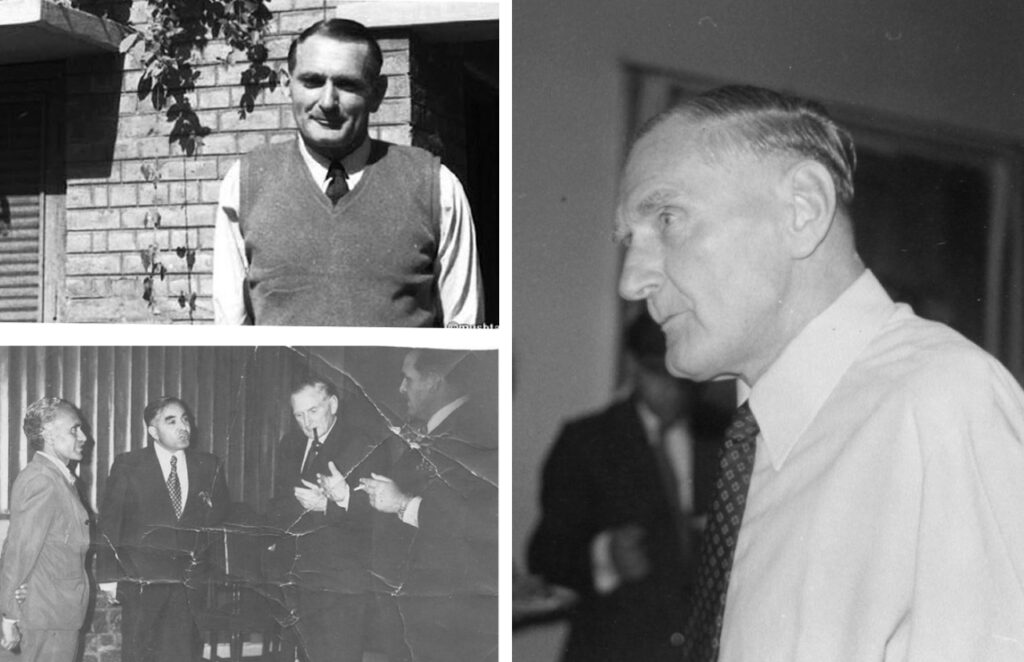
The fact that he returned to RIMC in 1946 is testament to the fondness he had for the subcontinent. Owing to his dedication and competence, he was appointed Principal RIMC on 1 October 1948. He kept on teaching during the tumultuous years of the independence.
Hugh Catchpole was not concerned with the political, social or theological differences between his diverse array of students. However, even he could not remain unaffected by the ensuing chaos. The abrupt removal of the Muslim cadets moved him deeply. One of his favourite students, Col (R) Qayum narrates an instance.
“I still remember when I left Mr. Catchpole. Very stern man externally, fighting back tears. He presented me with a transistor radio wrapped in a towel. ‘Qayum…the other teachers must not know that I gave this to you!” reminisces Col (R) Qayum.
He treated them equally, being considerate and sensitive to their individual beliefs. And this sensitivity he instilled in his students, as well. Lt Gen Javed Ashraf Qazi remembers an anecdote.
It was 1965. The Suez Canal crisis had just occurred and the British had invaded Egypt. When Hugh Catchpole discussed the matter in his class, Javed Ashraf and another student Khizerullah became riled up, cussing the British to no end. Hugh Catchpole listened patiently. After the class was over, he called both the students in his office.
“I want to tell you something, for your future lives. You people were insensitive. I am British and you were cussing my country. Be always mindful wherever you go that who is the person opposite to you.” narrates Javed Ashraf Qazi, who went on to become a Lieutenant General “We felt ashamed and said ‘We are very sorry, sir, we shouldn’t have done it.’ He replied ‘No, no, it does not matter, you are children, but remember (this) for your future lives.’”
After his contract ended with RIMC in 1954, Catchpole arrived in Pakistan, all ready to be part of Aitcheson College in Lahore. At the time, Major General Sher Ali believed that there was dire need of an institution which groomed pupils for the military. To this end, he was orchestrating the establishment of a cadet college in Hasanabdal. The army had insufficient funds to construct the school and he had to convince Punjab government to cover the expenses. Despite of these obstacles, Major General Sher Ali actualized his vision. When he came to know that Hugh Catchpole was in Pakistan, he pounced upon the occasion and offered him the post of founding principal of the college. Sher Ali was joined by other legendary ‘Rimcolians’, Air Marshal Asghar Khan and Air Marshal Nur Khan, who knew there was no better man for the job. Catchpole happily agreed to take up the mantle and set about overlooking the establishment of a residential school in Hasanabdal. As 1953 neared its end, the school was ready to induct its first batch. Its name at the time, as decided by Hugh Catchpole, was Punjab Cadet College. Hugh Catchpole served as the principal till 1958. He remained a bachelor his entire life. He was an educationist, humanist and philanthropist. He devoted his life to his students and his work. He was well-aware of the fact that in order to be a good custodian, he needed to know his students inside out. This he demanded from his staff, as well. Col (R) Qayum of RIMC, who still possessed his prized transistor gifted to him by Catchpole, received a call when Hasanabdal Cadet College was being established. Apparently, Hugh Catchpole had transferred to Pakistan and he had specifically asked for him to be a part of the cadet college personally. Col (R) Qayum happily consented.
“Qayum, if you don’t know these boys better than their mothers do…you are not fit to be the master.” Col (R) Qayum proudly narrates the instructions given to him by Hugh Catchpole.
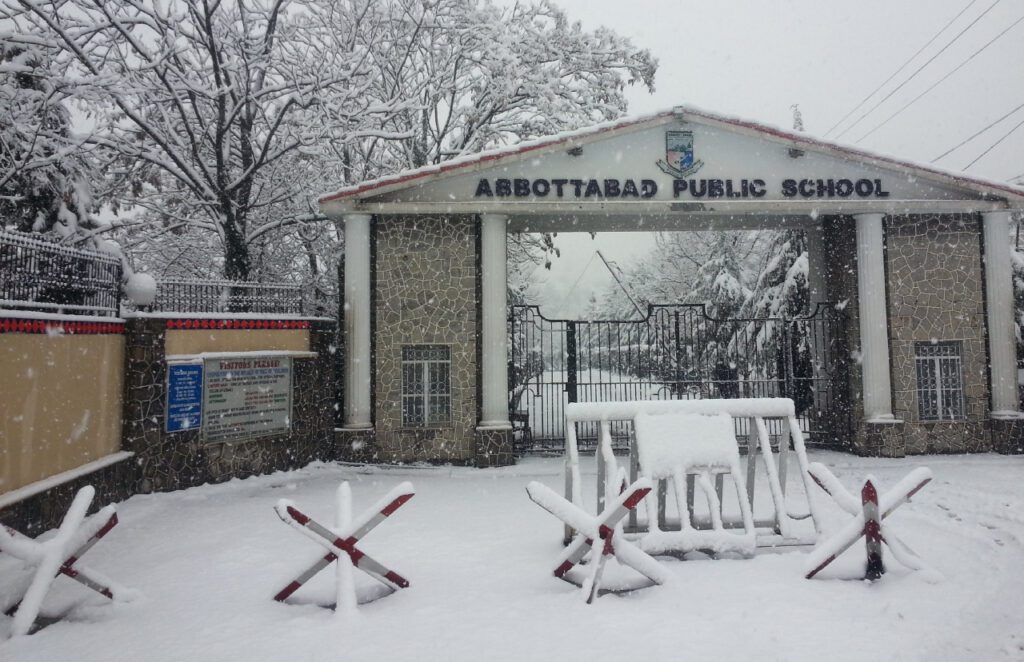
In 1958, Hugh Catchpole left Cadet College Hasanabdal and took up the mantle of principal at PAF Public School, Sargodha on the request of his beloved student, Air Marshal Asghar Khan, who was commanding the PAF at that time. Hugh Catchpole was a strict disciplinarian. However, he also knew how to be immensely charming and make his students grow fond of him. His sense of humour was rich and led to his success as a teacher. He commanded respect but his students were also well-aware that he could never be unfair.
General Ehsan ul Haque was a student of Hugh Catchpole in Sargodha. He narrates an incident wherein he and two of his friends were returning from the PAF cinema. ‘Double-riding’ on a bike was strictly forbidden and the friends were riding three on a bike. As soon as they entered the gate, they heard a loud ‘Stop!’. It was the principal, Hugh Catchpole. He berated them for double-riding and told them to report to him the next morning. They went to his office the next day and Mr. Catchpole enquired why they were there.
“We started to remind him and he interrupted us ‘I remember you boys but I have checked the school rules. They dictate that double-riding is not allowed. Since you were not double-riding but triple riding, that’s not an offense.’ Mr. Hugh catchpole told us with a smile.” General Ehsan ul Haque remembers fondly.
Being a native English speaker, Hugh Catchpole had an advantage when it came teaching English. However, this advantage merely complimented his already unique and effective teaching style. Air Chief Marshal Tanvir Mehmood Ahmed was his student in Sargodha and remembers the first day in his class. Hugh Catchpole narrated to them the tale of ‘Ali Baba and 40 thieves’ and asked to paraphrase the entire narrative in their words. Once this was done, Hugh Catchpole gave each and every one of them detailed critique about his work. This method of hands-on instructions was unheard of in those days. Another instance that Air Chief Marshal Tanvir Mehmood recalls is Hugh Catchpole’s intrinsic ability to decipher personalities of his students thoroughly. He achieved this by studiously following the progress of his students. “When I completed my matriculation, I achieved very good grades, along-with all the others friends. By this time, Mr. Catchpole had left, gone back to England. But from there, he found our results, because he was keeping track of us. He wrote me a letter, stating that he was aware of our results and he was very pleased to see (our results).” reminisces Air Chief Marshal Tanvir Mehmood Ahmed. “Let me tell you, in those few years (in Sargodha), he knew all his students so well, that every 6 months, when parents used to receive the report from the school, it used to describe the personality of every boy very accurately in just two lines.”, he further added. During the school days, ACM Tanvir Mehmood kept all the notes of English taught by him and found them to be very useful during his career. Later, when he became the Chief of the Air Staff, he compiled them into a notebook and published them with a title ‘Reminisces’.
Catchpole retired from PAF School, Sargodha in 1967. The hot weather did not suit him in that age and he was looking to move to a cooler city. He had also figured out over the years that he much preferred teaching over administrative roles. These two preferences of his were met perfectly in Abbottabad Public School. He joined APS as HOD of the English department. APS was his final abode and he held office there till his last.
Besides teaching, the Englishman also carried an undying love for sports. His passion for cricket burned bright till his last days. This was evident in the fact that, even after the age of 60, he served as the cricket coach for 11 long years till he was 71. Cricket wasn’t his only calling when it came to sports. In a letter to M. M. Karim, a former student, he writes “I shall probably go to London and see someone who specializes in hip operations. This seems to be the only chance of walking again and challenging Jansher Khan at squash.”
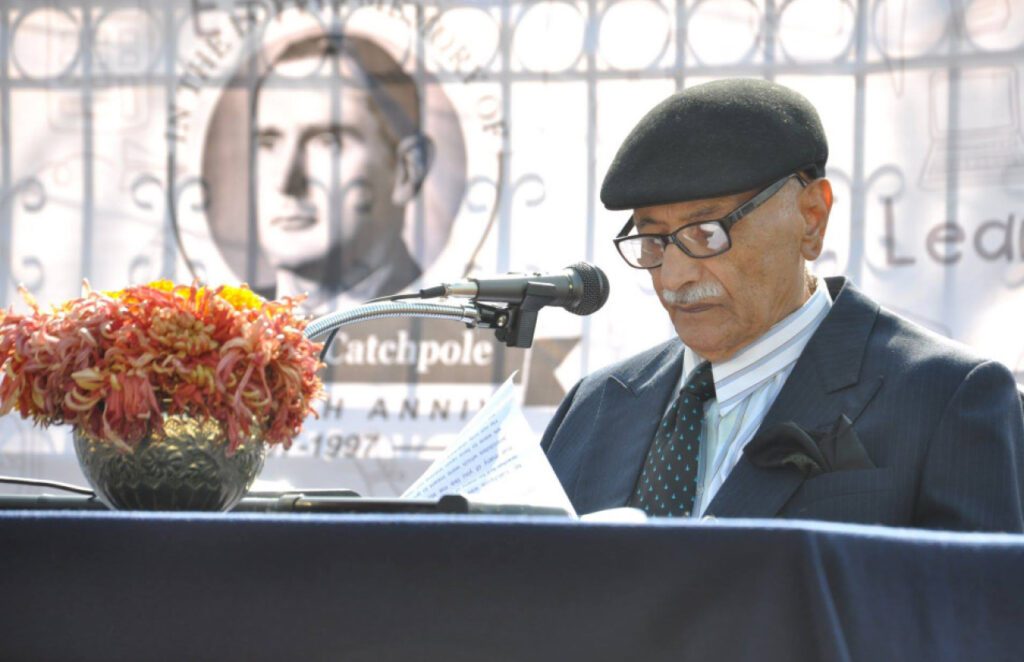
That statement embodies the work ethic of Hugh Catchpole. He was not a man after material things or fame or anything of such sort. He worked because it gave him purpose. “If I retire, I expire.” His colleagues used to hear him say often. He accumulated little in terms of material wealth, and what humble sum he did manage to earn, he invested it back in the institutions he was a part of. Plaques of his title can be seen in all the institutions that he has served. He has donated a squash court and a guesthouse to RMC, Dheradun. He has made a handsome donation to Cadet College Hasanabdal. Even during his last days, he donated for a computer wing to Abbottabad public school. General Ahsan Hyat, a former student, used to visit him often. On one of these visits he asked Hugh Catchpole what other ventures he had besides teaching.
“I am financially supporting the schooling of a few very talented poor boys in Pakistan…, well, I mean, I earned my money here in this country. I might as well put it back into it”. Hugh Catchpole replied. Hugh Catchpole received many awards, both while he was alive and posthumous. Hugh Catchpole was honoured twice by Queen Elizabeth. In 1971, he was awarded the Order of the British Empire (OBE). In 1980, the queen awarded him Commander’s Badge of the Order of the British Empire (CBE) also called the Most Excellent Order of the British Empire. In 1979, the president of Pakistan, General Zia-ul-Haq, awarded Mr Catchpole “Sitara-e-Imtiaz” for his meritorious services in the field of education. On 15 June, 2007, then President General Pervez Musharraf conferred upon Mr Catchpole the highest civil award of Pakistan “Hilal-e-Imtiaz”, posthumous, for his unparalleled, noble and single-minded devotion to the cause of education in Pakistan. The British Council, Pakistan erected a Sir Hugh Catchpole Library at Abbottabad Public School recently in great teacher’s honour. This Englishman, who had touched the lives of thousands across three nations and beyond, was taken away from us on 1 February, 1997. He was buried with the honours that are appropriate for great men. In his will, he wished to donate all balances of his account to institutions he had been associated with. More than Rs 8 million was donated by him to different institutions including Ipswich School, Suffolk, UK, Rashtriya Indian Military College Dehra Dun, Cadet College Hasan Abdal, PAF Public School Sargodha and Abbottabad Public School. On 4 February 1997 , since its establishment of Christ church Rawalpindi in 1842, it was for the first time that the congregation was mostly Muslim. Amidst the haunting notes of several army buglers, he was lowered into his grave, surrounded by Air Marshals, Generals, bureaucrats, colleagues, students and civilians. Most of these prestigious set of men were his students who were honouring him. Air Marshal Asghar Khan was one of the ones who laid a wreath during his funeral. He was laid in the grounds of Cadet College Hasanabdal, the college he founded in 1953 and of which he was the Principal. Hugh Catchpole proudly rests there to this very day.
